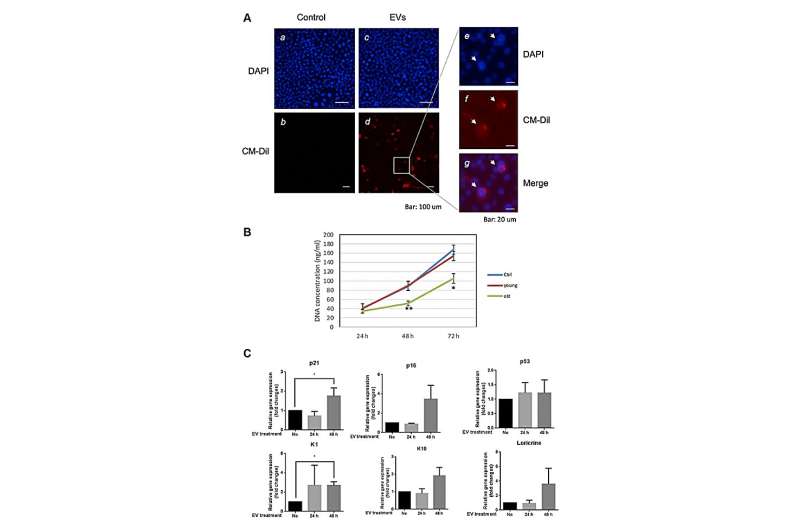This article has been reviewed according to Science X's editorial process and policies. Editors have highlighted the following attributes while ensuring the content's credibility:
fact-checked
proofread
Aging modulates extracellular vesicles of epidermal keratinocytes, finds study

A new research paper was published on the cover of Aging titled, "Chronological aging impacts abundance, function and microRNA content of extracellular vesicles produced by human epidermal keratinocytes."
The disturbance of intercellular communication is one of the hallmarks of aging. In their new study, researchers Taku Nedachi, Christelle Bonod, Julie Rorteau, Wafae Chinoune, Yuri Ishiuchi, Sandrine Hughes, Benjamin Gillet, Nicolas Bechetoille, Dominique Sigaudo-Roussel, and Jérôme Lamartine from the University of Lyon, Toyo University and Gattefossé SAS aimed to clarify the impact of chronological aging on extracellular vesicles (EVs), a key mode of communication in mammalian tissues.
"The present study was therefore conducted to elucidate whether the characteristics of EVs released from cultured human keratinocytes can be modulated during aging process," the authors say.
The researchers focused on epidermal keratinocytes, the main cells of the outer protective layer of the skin, which is strongly impaired in the skin of the elderly. EVs were purified from a conditioned medium of primary keratinocytes isolated from infant or aged adult skin. A significant increase in the relative number of EVs released from aged keratinocytes was observed, whereas their size distribution was not modified.
By small RNA sequencing, the researchers described a specific microRNA (miRNA) signature of aged EVs with increased abundance of miR-30a, a key regulator of barrier function in the human epidermis.
EVs from aged keratinocytes were found to be able to reduce the proliferation of young keratinocytes, impact their organogenesis properties in a reconstructed epidermis model, and slow down the early steps of skin wound healing in mice, three features observed in the aged epidermis. This work reveals that intercellular communication mediated by EVs is modulated during the aging process in keratinocytes and might be involved in the functional defects observed in aged skin.
"To conclude, we have shown here that aging modulates EVs abundance, function and microRNA content in human keratinocytes," the researchers say.
More information: Taku Nedachi et al, Chronological aging impacts abundance, function and microRNA content of extracellular vesicles produced by human epidermal keratinocytes, Aging (2023). DOI: 10.18632/aging.205245




















